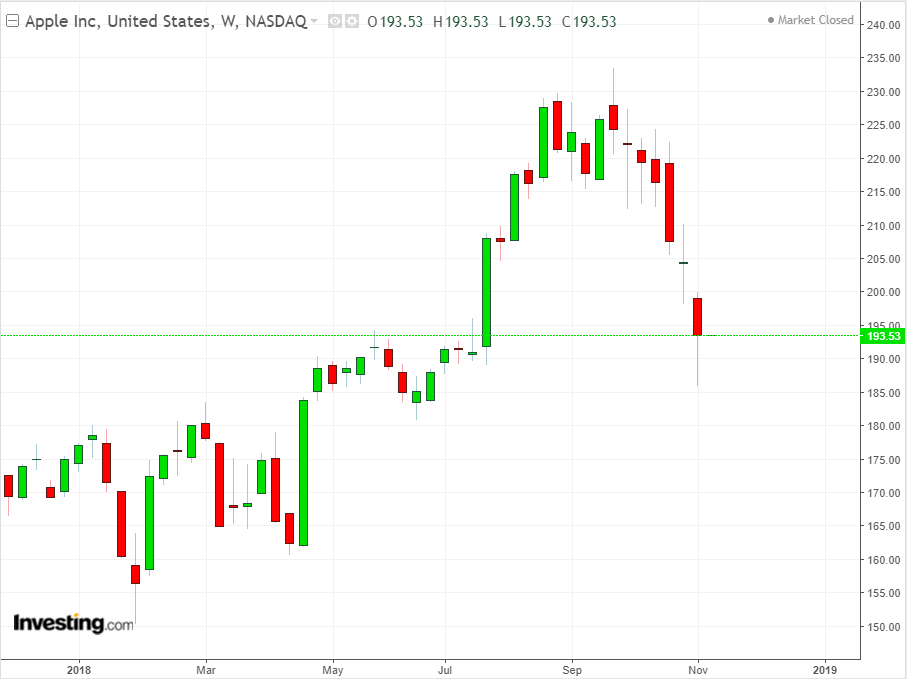One of the most volatile earnings seasons in recent years is coming to an end. That's the good news.
The bad news is that the results have clouded the market outlook rather than provided investors with some clarity about the future. Consider, for example the technology giants, the companies that were primarily responsible for fueling the unprecedented rally of the past decade. Most of these firms are clearly entering a slow patch and have failed to create excitement, just when the markets need it badly.
The biggest economic growth engines—Facebook (NASDAQ:FB), Alphabet (NASDAQ:GOOGL) and Amazon (NASDAQ:AMZN)—delivered earnings that were generally a mixed bag. What investors took away from those numbers were only promises for the future, with nothing concrete, as these companies shift their business models in order to come to terms with the new realities of the market, where preventing privacy breaches and political manipulation takes priority over anything else.
Amazon, the biggest online retailer, reported a second consecutive quarter of sales that fell short of estimates, while Alphabet’s third quarter sales missed analyst expectations, with revenue growth from its main Google sites, including Search and YouTube, coming in slower than the prior period.

One of the biggest disappointments in the technology space came from the most valuable company in the world by market cap, Apple (NASDAQ:AAPL). After the smartphone and media device manufacturer released earnings on November 1, then announced during its earnings call that it would stop disclosing iPhone sales data, its stock went into a steep decline, losing 7% immediately after the forward guidance was released.
Over the next two weeks, shares plummeted, falling more than 16%, reaching their lowest level since late June. The sell-off accelerated when a number of Apple suppliers cut their demand forecasts, clouding the demand outlook for the company’s flagship iPhone during the biggest holiday season of the year.
Worsening Macro Environment
Though the negative earnings surprises undoubtedly played a part in the sell-off of these marquee tech names, it’s hard to ignore the worsening macro environment and larger anxieties about growth and volatility that are forcing investors to look for safety.
Evidence of this trend came from the still thriving retail sector. Some of the nation’s largest retailers, including Walmart (NYSE:WMT), Macy’s (NYSE:M) and Home Depot (NYSE:HD), saw their share prices pressured despite each having posted strong earnings and positive forward guidance for Q4.
During last week's earnings release, Walmart, the largest big-box retailer, reported a rise in quarterly sales and boosted its profit outlook for the year. Its online sales also surged, offering yet more clear proof that it's well on track to take on its main rival, Amazon.
The company also continued to expand its click-and-collect services, which are now available at 2,100 stores, as well as grocery delivery, offered from 600 locations. These efforts pushed its online sales growth to more than 40% in the quarter. Nevertheless, Walmart shares slipped during the past week, losing about 6%.
Big Oil was one bright spot. Some of the biggest oil and gas producers, including Exxon Mobil (NYSE:NYSE:XOM) and Chevron (NYSE:CVX) each delivered their strongest third quarter results in four years, showing profits not seen since the days of $100 crude.
Both companies reported double-digit production increases in the Permian Basin, the shale region in Texas and New Mexico that’s propelling total US oil output to all-time highs. The Permian now makes up 11% of Chevron’s overall output and is home to Exxon’s fastest growing large project.
Bottom Line
The major takeaway from this earnings season: companies are facing cost pressures as wages and interest rates rise. That trend, combined with global growth worries and trade war anxieties, will make it very difficult for even healthy companies to produce stunning earning results going forward.
In this environment of fear and uncertainty, there are a few areas of refuge—companies which are defensive, pay reliable dividends and perform well in market downturns. Three consumer staple sector sector stalwarts, Procter & Gamble (NYSE:PG), McDonald's (NYSE:MCD), and Coca Cola (NYSE:KO) are a few strong examples. Each could provide protection when little else seems to be working.
